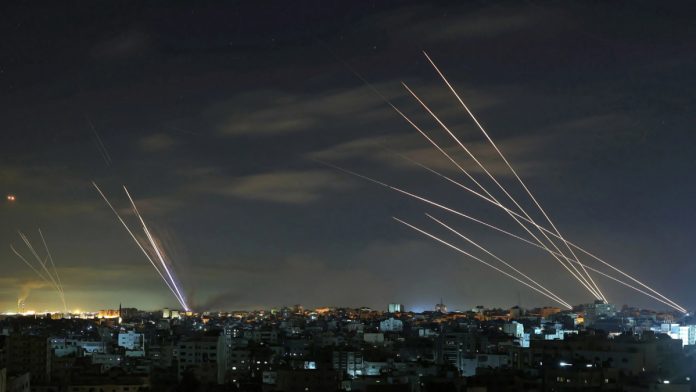Wajeeha Najam
The escalating tensions between Iran and Israel have thrust the Middle East into a precarious and volatile situation. Iran launched a significant offensive against Israel, utilizing a formidable arsenal of approximately 170 drones, over 30 cruise missiles, and more than 120 ballistic missiles, targeting both Israel and the Israeli-occupied Golan Heights. This aggressive move was framed as a direct response to Israel’s bombing of the Iranian embassy in Damascus on 1 April 2024, an attack that led to the deaths of two Iranian generals. Notably, this marked a significant escalation, as it represented Iran’s first direct assault on Israel since the onset of their proxy conflict.
In retaliation to Iran’s aggressive actions, Israel executed a military strike on Iran on 19 April 2024. This retaliatory measure by Israel further exacerbated tensions and raised concerns about the potential for a wider conflict in the region. The international community, including the United States, closely monitored the situation and expressed growing apprehension about the escalating hostilities between Iran and Israel.
Amidst these heightened tensions, Iran’s pursuit of nuclear capabilities has garnered international scrutiny, prompting mounting pressure and the looming threat of sanctions. In response, Iran has signaled a recognition of the imperative of diplomacy, actively seeking meaningful dialogue with neighboring nations and global powers.
Iran’s defense strategy, rooted in deterring external threats and safeguarding national interests, encompasses a mix of conventional and unconventional warfare capabilities, including ballistic missiles and a formidable presence in cyber warfare. The country’s emphasis on bolstering its domestic defense industry and investing in advanced military technologies underscores its commitment to strategic self-sufficiency. Conversely, Israel, long regarded for its qualitative military superiority, has had to recalibrate its defense strategy within the shifting balance of power.
Maintaining a cautious and strategic approach, Israel seeks to secure its territory. Israel’s defense strategy rests on the development and acquisition of advanced technologies, supported by substantial investment in intelligence capabilities. The country has continued to fortify its air defense systems, cyber capabilities, and precision-guided arms, while solidifying its regional alliances to bolster its security posture. These developments underscore the intricate and evolving nature of the defense tactics of both Iran and Israel.
As they navigate the complex geopolitical landscape, these nations are steadfastly focused on safeguarding their national interests, although through contrasting approaches. The unfolding events demand a distinction understanding of the region’s dynamics and the delicate balance of power, as well as a keen awareness of the potential implications for global stability.
In the wake of the escalating tensions between Iran and Israel, Pakistan finds itself in a delicate position, strategically positioned at the crossroads of major transit routes between the Middle East and South Asia.
The situation, which unfolded after 1 April 2024, has placed Pakistan in a challenging diplomatic landscape, with implications for its regional relations and security considerations. Iran’s unprecedented air attack on Israel on 13 April 2024, and the subsequent defensive efforts to intercept Iran’s drones and missiles have drawn significant international attention. The United States, in particular, has been actively engaged in diplomatic efforts, with Secretary Blinken holding discussions with foreign counterparts to convey messages indirectly to Iran and to urge other countries to discourage Iran from escalating the conflict.
This underscores the gravity of the situation and the international community’s concerted efforts to mitigate further escalation. Pakistan’s own experiences with cross-border strikes from Iran earlier in the year have added complexity to its stance. Iran’s actions, including missile strikes into Pakistan’s Baluchistan province, have underscored the regional implications of the conflict. Pakistan’s response to these strikes, including the targeting of hideouts in Iran’s Sistan-Baluchistan province, reflects the intricate dynamics at play and the need to navigate a delicate balance between safeguarding its sovereignty and managing regional tensions.
Furthermore, the visit of Iranian President Ebrahim Raisi to Pakistan in late April 2024 holds significance in the context of the escalating tensions. This visit, occurring shortly after the exchange of cross-border strikes between Iran and Pakistan, underscores the importance of maintaining friendly relations and deep historical bonds between the two nations. It signals a concerted effort to diffuse the standoff and underscores the critical role of diplomacy in stabilizing the region.
In the core of these developments, Pakistan’s response to the escalating tensions between Iran and Israel has been characterized by a call for restraint and a strong emphasis on the need for diplomacy to stabilize the situation. This stance reflects Pakistan’s recognition of the imperative to navigate the complex geopolitical landscape and to contribute to regional stability. As the situation continues to unfold, Pakistan’s foreign policy in the context of the Iran-Israel conflict underscores the country’s strategic importance and the need for a distinct and balanced approach to safeguard its national interests while contributing to regional stability and diplomacy.
The author is a Research Officer at the Rabita Forum International (RFI).







